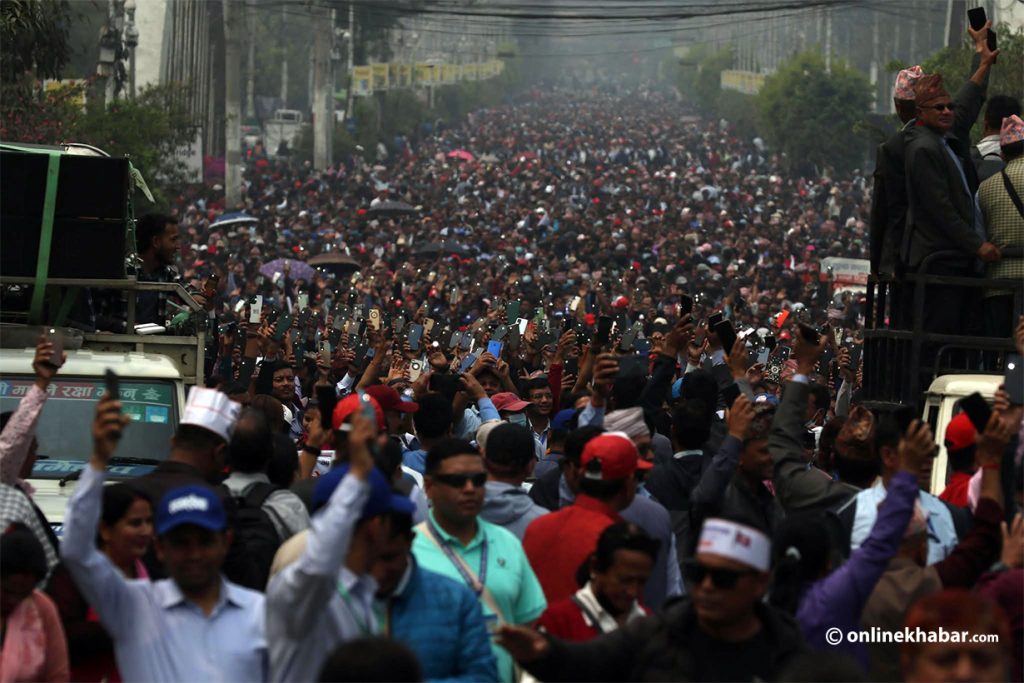
The Ministry of Land Management, Cooperatives, and Poverty Alleviation declined to publish a notice in the Nepal Gazette, stating that the decision to auction land made during the meeting of the Council of Ministers on April 17 was unclear and incomplete.
Due to the lack of interest from the then Chief Secretary, Shanker Das Bairagi, in clarifying or verifying the confusion, the decision remained unimplemented for nearly four months.
On August 10, Prime Minister Pushpa Kamal Dahal questioned the Council why the decision had not been implemented during a meeting. During the meeting, Dahal made a sharp comment and questioned why the secretary was not following or implementing the cabinet decision arbitrarily.
During the meeting, additional decisions were made, and the amendment to the Land Use Regulations (2022) was initiated. The old decision has now begun to be implemented this month.
Nepal’s bureaucrats continue to hold power to implement decisions made by the government. However, due to the prejudice of these bureaucrats and the influence of intermediaries, there have been countless incidents where these decisions have not been implemented.
Series of indecisiveness by bureaucrats

The cabinet’s decision, on July 5, to extend the contracts of ailing projects is yet to come into effect. The contractors have given their applications, however, the President of the Federation of Contractors’ Associations of Nepal (FCAN) Rabi Singh says, “The problem is that the authorities are not ready to take responsibility for the projects or extend the deadlines as per the cabinet’s decision.”
On January 25, a cabinet meeting decided to allow the crusher industry to pay the due fees and taxes, to renew their license that was pending due to the renewed standards. However, district-level offices of small and cottage industries did not heed. They deferred the renewal of the crusher industry, citing that the cabinet decision was unclear and not a strong enough reason.
In the budget for the current fiscal year, the government announced to either dismiss and/or merge or restructure 21 entities including institutes, committees, boards, etc. The relevant ministries are still undecided on the matter of transferring and distributing their assets and liabilities.
A secretary-level meeting, on July 17, decided to proceed with the process immediately and collect concrete evidence in coordination with the Ministry of Federal Affairs and General Administration (MoFAGA) and the Ministry of Finance (MoF). The Finance Ministry will submit a comprehensive draft to the Office of the Prime Minister and Council of Ministers (OPMCM) by mid-August.
However, due to pressure from various interest groups and complications arising from dissatisfaction with the management, bureaucrats at the Finance Ministry have not made a decision. Therefore, the secretary meeting, on August 21, decided that a decision should be made on this matter by mid-September.
Administrative and constitutional expert, Kashi Raj Dahal, asserts that when a government employee or bureaucrat refuses to execute tasks within their designated jurisdiction or evades decision-making, it should be deemed as a wrongful action. Nevertheless, he says that the absence of a monitoring body has resulted in a state of confusion.
According to Dahal, before the promulgation of the Constitution in 2015, the Commission for the Investigation of Abuse of Authority (CIAA) used to take action against any wrongdoings–ranging from bureaucrats. From not making decisions within their jurisdictions to making decisions unfairly, any wrongdoing was punished. However, for the past eight years, no government employee has faced legal action for improper actions.
“Someone must undertake the task of investigating and instructing as well as taking action against the wrongdoings,” says Dahal. “When decisions are made beyond one’s authority or not as per one’s responsibilities, the suspended time of action increases with significant delays in implementation.”
Scepticism runs high

Recently, during the PM’s National Development Problem Solving Committee meeting, PM Dahal expressed concern that ministers, secretaries, and staff were refraining from making decisions for fear of landing in controversies or court cases.
On August 10, after putting forward his discontentment, he also pushed for prompt action to rectify the government’s inclination to avoid taking risks in the decision-making process and to demonstrate a commitment to upholding the law. However, PM Dahal’s words have failed to persuade the employees and the officials are seeing the same results.
A recent example of this is the ongoing Tinkune compensation dispute.
According to sources, after Balen Shah, the mayor of Kathmandu metropolitan city, brought their attention to resolve the dispute over Tinkune compensation delays, PM Dahal instructed the concerned ministries to expedite its resolution. However, the District Administration Office has been unwilling to acquire the land as per the new valuation given the land had been nationalised without distributing compensation. But this has resulted in Kathmandu metropolis’ plan for Tinkune to be halted.
Meanwhile, the officials are concerned about landing in a similar controversy to the Lalita Niwas land case, if they give compensation for the already-acquired land. An official from the PM’s office shares, “Even decisions that involve little to no risks are being forwarded to the cabinet for the final decision.”
Due to the legal framework, which prohibits the CIAA from investigating decisions made by the cabinet, matters that could potentially be contentious are being referred to the Council of Ministers. Recently, a proposal for an annual maintenance contract regarding the National Identity Card Management Information System/Procedure has also been submitted to the cabinet.
The contract was supposed to be signed last year, however, the contractor has been working without payment for a year. Currently, the Ministry of Home Affairs (MoHA) and the Department of National ID and Civil Registration (DNCR) are striving to secure a decision from the cabinet regarding the agreement.
Recently, ministers have been reporting to the prime minister that it has been difficult to appoint the head in offices where any kind of sensitive decisions are to be taken.
For the past month, the Department of Transport Management (DoTM) does not have a director general. According to sources, the Ministry of Physical Infrastructure and Transport (MoPIT) attempted to assign a Director General, but the available joint secretaries have not agreed to take the responsibility.
The official adds, “Various decisions like the smart license cards, maintenance contracts for various systems, and contracts for producing embossed number plates are still pending, and they all carry a degree of risk, resulting in hesitation.”
What is the problem?

On the other hand, the news broke out that Chief Secretary Baikuntha Aryal has been summoned to give a statement to the CIAA regarding the national payment gateway deal. It has heightened hesitation within the bureaucracy.
An incumbent secretary shares the situation is turning grave because the few officials who made risky decisions have been made to admit guilt while the government has not made attempts to protect the individuals.
Speaking further, the secretary shares how secretary Krishna Bahadur Raut, who was recently implicated in the Lalita Niwas land case, was allowed to continue in his position whereas the Chief District Officer of Dang, Sushil Vaidya, also implicated in the same case, is suffering.
The secretary says, “Given the discriminatory political trend, who would be willing to make decisions and jeopardise their career?”
A deputy director general from the Department of Road says, “Even when we make decisions following the directives from the higher-ups, we find ourselves in a situation where we may end up in jail or have to deal with legal repercussions.”
Former secretary Sharda Prasad Trital expresses frustration with the practice of shielding political leaders who make erroneous decisions.
“It’s unreasonable for those who simply follow orders to be deemed guilty while the leaders who ask us to make the decisions escape the music. They should share equal accountability,” says Trital.
Trital further asserts that even honest employees land have been landing in such controversies, hence, everyone is now hesitant to spearhead any decisions and prefers to delay the process. He emphasises though that employees should not feel hesitant to voice their opinions on whether a decision aligns with the law or not and whether it is correct or not.
“And if there is disagreement, the leadership should decide who is correct,” says Trital.
Former election commission secretary Gopinath Mainali voices the same problem where burdens fall on the shoulders of low-level officials, never the higher-ups. Mainali also pointed out that delays in decision-making grow when the leadership appoints individuals lacking expertise or professionalism.
Referring to the fake Bhutanese refugee scam, he points out the incident where the secretary from the education sector was dragged into the scam after being transferred to the home ministry.
He also hints that political leaders tend to seek individuals with little to no decision-making abilities to influence them easily.
He adds attempts are made to discourage those who do not align with their vested interest by transferring them multiple times. The employees are discontent with the system. He emphasised that it also leads to the loss of institutional knowledge when employees are transferred arbitrarily.
“Instead employees should be encouraged to learn and grow professionally, with such opportunities available in their own positions of offices and an environment to give their honest opinion, without the fear of being penalised or wrongfully accused and dragged into controversies if we want to remove the latency in decision-making among them.”
This story was translated from the original Nepali version and edited for clarity and length.
























